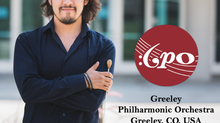The Future of the Orchestra Field by Framing Orchestra Enterprises as Cultural Commons
- Diego Barbosa-Vásquez
- Jun 8, 2023
- 5 min read
Updated: Nov 25, 2025
Para Versión en Español
This is a summary of my professional perspectives about the future of the Orchestra Field shared on the Plenary Closing Panel of the League of American Orchestras 2023 Conference

The future has always amazed humans in ways we can barely understand. Perhaps, the enormous amount of possibilities of the unknown, perfectly paired with personal dreams and the human desire for utopian worlds, are part of the reasons. And for us as artists, the future becomes the perfect scenario where we can see us sharing with multiple communities in a perfect experience where music and arts is the common language of our souls. But to arrive to that, we all have the responsibility of learning very in depth all of the current systems of our field and figure out the necessary steps to make that future happen, two very important things in which the role of the League of American Orchestras Annual Conference is crucial. However, in order to walk through these steps and create real and sustainable change, we also need to identify the fundamental frameworks and systems that govern our Orchestra Enterprises. Systems that are allowing us, or preventing us, to make the core necessary changes.
Based on my background as Colombian-born Opera, Orchestra, and Ballet Conductor, Arts Administrator, and Scholar, worldwide trained and now based in the US; I consider that is crucial for our field to start embracing the Orchestra Enterprises as a Cultural Commons. A way to see common shared resources and experiences, in this case the orchestra enterprise, as endeavors in which every single stakeholder could benefit from it as well as has clearly defined responsibilities towards its sustainability. Based on multidisciplinary awarded international research (more info click here) this thinking will allow us to have a stronger understanding of the full orchestra field complexities, their full benefits to societies, and more importantly define the sustainable and complete matrix of the responsibilities that we all have as internal and external actors to secure the field sustainability. This way of thinking about the orchestra enterprises allow us to target at least four very important things:
1. It makes visible the core systems (in each orchestra, as well as in the whole field) that are not allowing us to move in the directions we want to move, and more importantly clarifies the specific strategies we can use to solve them. We all want better financial sustainability, we all want more community involvement, we all want no tokenism permeating our Diversity, Equity, Inclusion, and Belonging efforts, and we all want to accelerate the necessary changes to achieve these goals (See the League of American Orchestras New Strategic Framework)... But to achieve these goals, we need to change the core governance thinking of the Orchestra Enterprises, transforming it from what Socioeconomic scholars define as a Club reserved to only 8% of the population (current average number of population being part of the orchestra enterprise in the US), to a Cultural Common where every single person can be part of. An enterprise where musicians, administratives, donors, and all communities have decision making power as well as clear responsibilities securing the sustainability of our orchestra field.
2. It clarifies the differences between honoring traditions and the keeping of unsustainable models. During the last two centuries (others can argue even more), our field has confused honoring traditions with keeping old-centuries models. Examples are the old nonprofit governance and business structures with all its accesibility problems (more info Click here), colonial-based artistic music frameworks and field validators (more info Click here), antiquated artistic dogmas (More info Click here ), old pedagogic models (more info Click here), and our fears to learn from other types of sectors (more info Click here). Thinking the Orchestra Enterprise as a Cultural Common, not only encourages us to carefully understand the differences between the traditions and the systems that run them behind (with all of their logics and interest), but also separates them and encourages critical thinking to define which ones we want to keep and which ones we must address to get the changes we want. A process that under the Cultural Common framing is done with the community, the musicians, the administrators, the donors, and all the stakeholders sitting in the decision making table.
3. It allows the understanding that the Sustainability in our field is achieved by clever and strategic collaboration of ALL STAKEHOLDERS (internal and external). Seeing the Orchestra Enterprises as Cultural Commons, allows the deep understanding of how the MAP (Music, Artistic, and Pedagogical) and ABC (Administrative, Business, and Community) models that run our orchestras and our field, are interconnected and depend on each other (More Info Click Here). As an example, marketing or fundraising campaigns are successful only if the repertoire, the musicians, the guests, the staff, the tickets, the venue, the community, the donors, etc, are contemplated and carefully crafted into the whole season proposal and future seasons plan. Similarly, a strong artistic development plan involves human resources, business models, administrative concerns, community backing it up, etc. All stakeholders must collaborate and bring to the table their expertise, assets, and/or time under sustainable relationships when framing the Orchestra Enterprise as a Cultural Common.
4. It allows strong full stakeholders accountability no matter their level. The current governance models of our artistic enterprises create enormous barriers from multilevel effective accountability systems (more info Click here). Despite the incredible importance that a ticket holder, a volunteer, an administrator, or a musician represent to the full artistic enterprise, they have almost cero accountability power to the people leading the organizations. Under the current "Club" system, only few key people have access to the information and hold the accountability power towards the people bellow them. The majority of the stakeholders are not allowed to even see why and how the artistic decisions are made, how the full organization budget is designed and actually used and distributed at itemized level, or how the mission and vision is being developed and pursued because of all these decisions. On the other hand, under the framing of Orchestra Enterprises as Cultural Commons, a better multilevel accountability becomes fundamental in order to create and enforce sustainable relationships between all the stakeholders. Of course organizations will define data protection models that do not affect their strategic advantage, but with orchestra enterprises as a cultural commons, every single stakeholder has the right to know the full picture and make other actors accountable of their responsibilities and decisions no matter their level on the organization structure.
The League of American Orchestras Conference shows us that together we are stronger and together we can advance the field. But to keep stronger and continue advancing our field, we need to create sustainable relationships that allow every single stakeholder to feel valued, empowered, and motivated to keep collaborating and continue growing together. It is very exciting to see this amount of people attending the League of American Orchestras Conference, because that means we are working tirelessly to find these sustainable relationships, and I consider, based on tons of practical research and my own 14 years of international experience on the field, that the Orchestra Enterprise seen as a Cultural Common, is the way to go to continue advancing the field.
The participation of Maestro Barbosa-Vasquez in the 2023 League of American Orchestras Conference is possible because of the highly coveted continental scholarships awarded by Orchestra Careers and Le Moyne College
See the Video of the Panel Here!
See the Full Plenary Session Here!



Picture of 2022 LAO Conference Closing Panel. Sharing with Simon Woods (President and CEO of the League), Maestro Thomas Wilkins (LAO Golden Baton 2022, and one of my Conducting Mentors at Indiana University), Maestro Wilbur Lin (a Conductor friend and colleague from Indiana Univeristy), and with the LAO Students Constituency.
































Comments